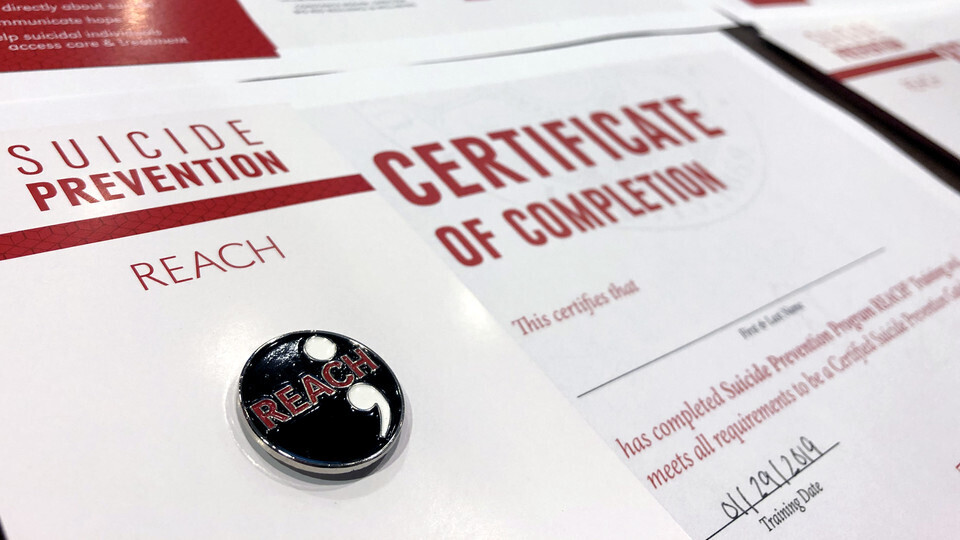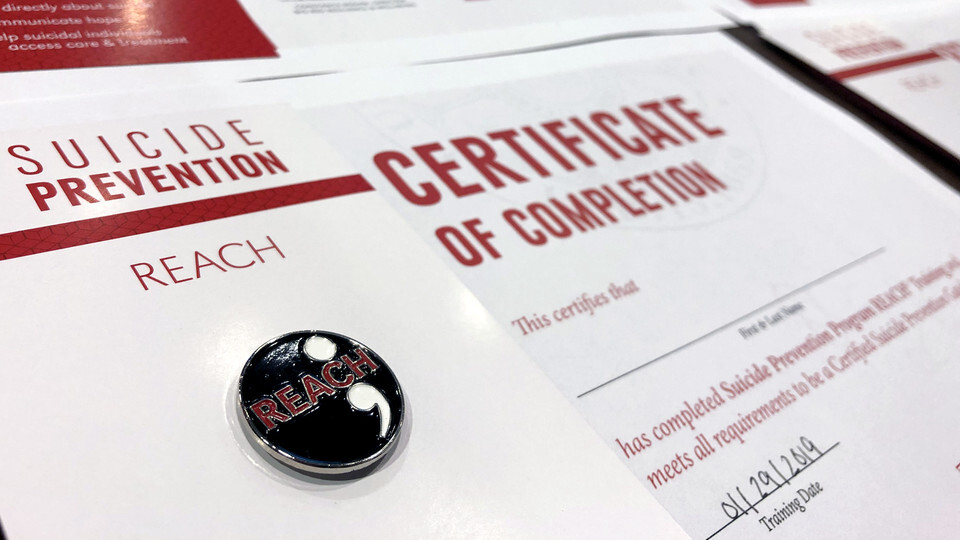
More than 5,000 University of Nebraska–Lincoln students, faculty and staff have completed REACH training since Big Red Resilience and Well-Being launched the program in 2018. In the current academic year, interest in the suicide prevention training program has increased significantly — especially among students.
“It’s super inspiring seeing these individuals request the trainings,” said Abbey Ragain, suicide prevention coordinator at Nebraska. “It’s encouraging knowing there are students who want to do this.”
REACH training teaches people how to prevent suicide by learning the risk factors, warning signs and how to intervene through a 90-minute session led by two certified trainers. The name of the program is an acronym that mirrors the five main takeaways — recognize warning signs; engage with empathy; ask directly about suicide; communicate hope; and help suicidal individuals access care and treatment. The program has typically only offered trainings to university- or student-affiliated organizations and departments but has recently started offering and promoting open trainings to any individuals on campus who are interested.
“Something is different about this year, though,” said Connie Boehm, director of Big Red Resilience and Well-Being. “Our open trainings, we like to keep them at 20 (people). They’ve been full where in the years past they have not.”
In addition to seeing an increase in the number of people who want to receive REACH training, more people want to become REACH trainers, according to Boehm, who said their recent application cycle pulled double-digit applications for new trainers.
Emma Farson, a junior biological sciences and psychology major, became a REACH trainer last fall. She was already a well-being coach and intern with Big Red Resilience and Well-Being and said she wanted to help fellow students struggling with suicide and other mental health issues. She said the increase in campus interest comes down to several factors, but most importantly the culture of caring on campus.
“Here at Nebraska, I honestly do think that everyone cares,” Farson said. “And I think we can see that reflected in the amount of people who are interested in being REACH trained and becoming REACH trainers themselves.”
Farson added that the increase in interest in getting trained likely comes from her generation’s progressiveness when it comes to destigmatizing mental health and suicide, which coincides with the mission of REACH.
“Our goal is to train students so they’ll be able to reach out to their friends to get rid of the stigma around getting help,” Boehm said. “That’s really, really key. And also to know the resources and get those students connected to help early.”
Beyond students feeling inspired from personal circumstances to get trained, Ragain and Big Red Resilience and Well-Being started spreading the word about open trainings and how to further get involved with the program on its Instagram account (@unlresilience) and website. Ragain said she curates a more casual look on Instagram to connect better with students and create a welcoming connotation.
Going forward, Boehm said the program is planning to create and launch a student storytelling campaign to further destigmatize conversations about suicide and mental health, in addition to wanting to weave trainings into classes and learning communities. She added that they’re developing a digital REACH training badge to coincide with the current enamel pins that students, faculty and staff receive upon completion of training. And while trainings are currently only offered in group settings, Big Red Resilience and Well-Being is looking into offering individual, drop-in trainings to accommodate people who want to become trained but may not be comfortable doing so in a large group.
Members of Big Red Resilience and Well-Being and REACH trainers encourage more students, faculty and staff to become trained in suicide prevention, even though the conversation is serious and can be difficult for some to face, because friends and family can be the first line of prevention and support with an individual who is in need of help.
“Something we all say as REACH trainers to anyone is that it is an uncomfortable conversation,” Farson said. “It’s going to feel weird. It’s going to feel uncomfortable. But it’s really what’s going to help at the end of the day. And even those people who have struggled with (suicide) themselves or within their family, having those resources available to you to be able to help someone — that’s what matters.”
To become REACH trained, you can request a group training or check Big Red Resilience and Well-Being’s calendar for open trainings. To become a REACH trainer, contact Abbey Ragain at abbey.ragain@unl.edu.








